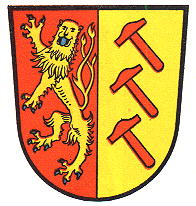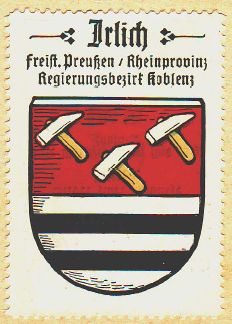Irlich: Difference between revisions
Jump to navigation
Jump to search
Knorrepoes (talk | contribs) m (Text replacement - "{{de}}" to "") |
Knorrepoes (talk | contribs) m (Text replacement - "{| class="wikitable"↵|+Official blazon↵|-↵|'''German'''↵| ↵|-↵|'''English''' ↵| {{blazon wanted}}↵|}" to "{| class="wikitable" |+Official blazon |- |'''German''' | blazon wanted |- |'''English''' | blazon wanted |}") |
||
| Line 13: | Line 13: | ||
|- | |- | ||
|'''German''' | |'''German''' | ||
| | | blazon wanted | ||
|- | |- | ||
|'''English''' | |'''English''' | ||
| | | blazon wanted | ||
|} | |} | ||
Revision as of 07:26, 6 April 2023
IRLICH
State : Rheinland-Pfalz
District (Kreis) : Neuwied
Incorporated into : 1969 Neuwied
| German | blazon wanted |
| English | blazon wanted |
Origin/meaning
The arms were granted in 1948.
The lion is the lion of the Counts of Sayn, as a large part of the municipality was part of the Sayn County. The hammers are derived from the arms of the Margraves of Hammerstein, who owned a small estate with the same name until 1405, which then became part of Sayn County. The composition already appears on the oldest known seals of the town, dating from 1525.
Hupp showed the arms in the 1920s in a slightly different composition, with the hammers and the arms of the Counts of Isenburg, see below.
| The arms by Hupp in the Kaffee Hag albums +/- 1925 |
Literature: Stadler, 1964-1971, 8 volumes; Hupp, O: Kaffee Hag albums, 1920s

